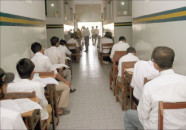Explaining the verdict: Legal references in the court order
A person accused of having committed contempt of court may, at any stage, submit an apology and the court.

Disqualifications for membership of Majlis-e-Shoora (Parliament)
1. A person shall be disqualified from being elected or chosen as, and from being, a member of the Majlis-e-Shoora (Parliament), if—
g) he is propagating any opinion, or acting in any manner, prejudicial to the Ideology of Pakistan, or the sovereignty, integrity or security of Pakistan, or morality, or the maintenance of public order, or the integrity or independence of the judiciary of Pakistan, or which defames or brings into ridicule the judiciary or the Armed Forces of Pakistan;
Article 204 (2) of Constitution:
A Court shall have power to punish any person who—
a) abuses, interferes with or obstructs the process of the Court in any way or disobeys any order of the Court;
b) scandalises the Court or otherwise does anything which tends to bring the Court or a Judge of the Court into hatred, ridicule or contempt;
c) does anything which tends to prejudice the determination of a matter pending before the Court; or
d) does any other thing which, by law, constitutes contempt of the Court.
Section 3 of the Contempt of Court Ordinance (2003):
Contempt of court: Whoever disobeys or disregards any order, direction or process of a court, which he is legally bound to obey; or commits a wilful breach of a valid undertaking given to a court; or does anything which is intended to or tends to bring the authority of a court or the administration of law into disrespect or disrepute, or to interfere with or obstruct or interrupt or prejudice the process of law or the due course of any judicial proceedings, or to lower the authority of a court or scandalise a judge in relation to his office, or to disturb the order or decorum of a court is said to commit “contempt of court”. The contempt is of three types, namely: the “civil contempt”, “criminal contempt” and “judicial contempt.”
Punishment under Article (5) of Contempt of Court Ordinance (2003):
(1) Subject to sub-section (92) any person who commits contempt of court shall be punished with imprisonment which may extend to six months simple imprisonment, or with fine which may extend to Rs100,000, or with both.
(2) A person accused of having committed contempt of court may, at any stage, submit an apology and the court, if satisfied that it is bona fide, may discharge him or remit his sentence. Explanation: The fact that an accused person genuinely believes that he has not committed contempt and enters a defence shall not detract from the bona fides of an apology.
(3) In case of a contempt having been committed, or alleged to have been committed, by a company, the responsibility therefore shall extend to the persons in the company, directly or indirectly, responsible for the same, who shall also be liable to be punished accordingly.
(4) Notwithstanding anything contained in any judgment, no court shall have the power to pass any order of punishment for or in relation to any act of contempt save and except in accordance with sub-section (1).
Published in The Express Tribune, April 27th, 2012.



















COMMENTS
Comments are moderated and generally will be posted if they are on-topic and not abusive.
For more information, please see our Comments FAQ